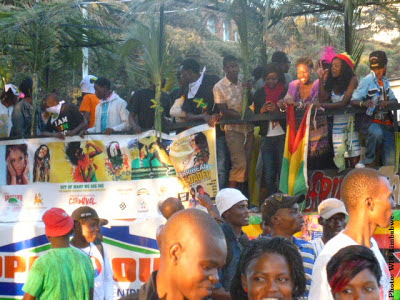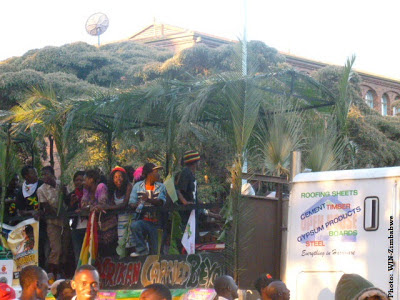Investigating Africa’s dilemmas
(Article first published in the Panorama Magazine)
African Roar 2012, the third in a series of the annual African Roar short story
anthology published by Story Time, is but a collection of unquenched wishes of
African citizens questing for freedom.
Edited by Zimbabweans Emmanuel Sigauke and Ivor W Hartmann, it features 11
short stories by writers from seven African countries including Zimbabwe.
Different styles and thematic depth characterize these tales of the physically
and psychologically wounded, the forgiving yet un-forgetting and those questing
for economic freedom in different situations across the continent.
In the story 'The Shady Taxi-Driver' by Hana Njau-Okolo set 15 years after the
dreadful 1998 bombing of the US Embassy in Kenya that wounded and killed
Kenyans, including Americans, the memories are still fresh especially in the
minds of those who saw the attack at close range. Kamau, the main character has
injuries sustained from the Embassy bomb attack, but apart from his
taxi-driving, has an ambiguous job in the office of the government
spokesperson.
Kamau represents the bomb attack survivors who believe they deserve something
from the Kenyan and US governments. Not just a “new swivel chair awarded him by
the supervisor”, which he declines or commemorations of the victims publicized
in the local media.
When Kamau reads in the newspaper that the Kenyan and US governments are
strengthening ties to prevent future attacks and that there would be a
commemoration of the victims, he is not amused.
He sees “Wretched hypocrisy” after he reads that a sculpture bearing names of
victims would be unveiled. Although the blast site has become a tourist
attraction, Kamau and others who were crippled by the bomb attack still feel
there is much more that can be done to bring peace.
Ivor W Hartmann’s story 'A Mouse Amongst Men' and Chika Onyenezi’s 'You Smile'
share a common outrage against Africa’s unemployment crisis even though the
stories are told from different perspectives.
While the protagonist in 'A Mouse Amongst Men' was exiled from his beloved
country when its economy went into free-fall, Emeka, the protagonist in 'You
Smile', does not leave his country but harbours the same outrage against the
socio-economic conditions.
The story 'A Mouse Amongst Men', using the first person and a powerful language,
reflects the notion that “all those glitters is not gold” for illegal
immigrants in South Africa. The narrator, who symbolically possesses an
old copy of the famous book House of Hunger by Dambudzo Marechera with the
“House of” part of the title no longer visible, thought by exiling himself he
would stumble upon economic freedom.
Faced with a bleak future in a foreign land, he regrets: “Once I thought I was
a man, now I am a mouse.”
In 'You Smile', Emeka the narrator tells the story directly to another nameless
character “you”. This puts the reader in the place of the “you” character
and the narrator confides in the reader.
Emeka, a jobless graduate and devout Christian, does not see himself as ever
leaving his country but hopes that things will be fine, as long as there is
hope.
While the reader feels that Emeka needs a job to redeem himself from his
worries, he also needs much more. Although he has turned to Christianity, his
evil past haunt him.
The psychological effects upon children participating in armed conflicts are
well captured in 'Soldiers of Stone' by Uko Bendi Udo.
Kulaja, the main character, a former child soldier in the Sierra Leone’s civil
war (1991-2001), is taken to New York by his brother Abu. On arrival in New
York, Kulaja buys a gun in the gangster-ridden streets of New York to protect
himself. When Abu discovers the gun and enquires how it came to be in his
house, Kulaja says: “When you are in the jungle, act like it.”
In 'The Colours of Silence' by Fesinachi Okoli-Okpagu, the reader witnesses a
marriage disintegrating because of money. Using the child as an observer,
the story is divided into sections and each section is represented by a colour.
The transition from joy to sorrow in the marriage between Mum and Dad takes the
form of a plucked leaf turning into different colours as it decomposes. With
Mum having won a raffle, Dad starts drinking, then domestic violence comes in,
and finally the wife and child escape during the dark night from the house of
horror.
The two stories 'The Revenge of Kamalaza Mayele' by Vukani G Nyirenda and 'How
Nnedi Got her Curved Spine' by Nnedi Okorafor largely draw from traditional
African folklore.
Polygamy is something that brings high social status in the story 'The Revenge
of Kamalaza' and this prompts Kamalaza, who is the main character, to think of
marrying a cetain widow in the village.
He is disappointed though when the widow he loves is taken by another
man. Here the writer brings to the readers’ attention the significant
role played by African oral tradition. Kamalaza, though disappointed, is a
village social commentator and uses his artistic skills to fight back.
'How Nnedi Got Her Curved Spine' is an exciting African fable. A young woman
Nnedi is captured by a troop of large baboons and is taught their way of life,
including their language. When she emerges from the initiation, she realizes
her spine has curved into an “s”.
'We Can See You' by Abdul Adam explores how friends and relatives view a person who
has been to America - considered to be the richest green pasture in the world.
Thirty five-year-old Mahmud Mare returns to Nairobi after spending several
years in America to marry Yasmin but he realizes Nairobi is still weighed down
by poverty and everyone who knew he had been to America is expecting something
from him.
The story 'Bottle' by Dawn Promislow is written in the present tense and takes
the reader back to the days of apartheid South Africa in the 1960’s and 1970’s
when certain public areas were mainly reserved for whites. Bella, a maid, lives
far from her husband and family. When her boss takes her and Iris, another
maid, to the beach reserved for blacks, she collects empty bottles and fill
them with sea water as a souvenir.
Mother and son relationship or the Oedipus complex is investigated in
'Sheltering Hearts' by Gothataone Moeng. The story is set in Gaborone. Katlo’s
unmarried mother, Mma-Kgosi, is a domineering person. One takes a cue from the
title 'Sheltering Hearts' in the sense that Katlo is faced with the dilemma of
having to find genuine companionship and yet suffering from “neglect” by her
own mother who is much more worried about her son.
The whole collection of African Roar 2012 screams with voices yearning to be
heard, voices that had lain ignored by the culture and politics of Africa. The
electronic edition was published in December 2012 and is available on
Amazon.com. The previous African Roar anthologies were published in 2010 and
2011.
- Reviewed By Beaven Tapureta











































